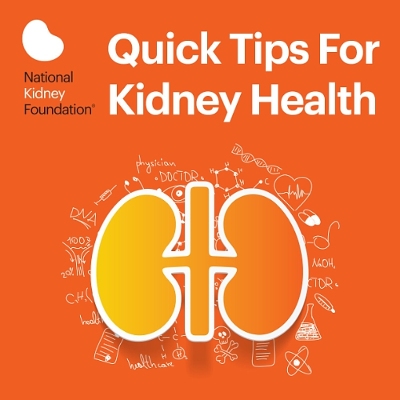March is National Kidney Month and the National Kidney Foundation is calling on all Americans to take five healthy steps for their kidneys. The kidneys are the body’s chemical factories, filtering waste and performing vital functions that control things like red blood cell production and blood pressure. But over time, the kidneys can become damaged with little or no physical symptoms to warn you that your kidneys are in trouble.
“Of the 26 million American adults estimated to have kidney disease, most don’t know they have it. That’s why taking care of your kidneys, especially if you are at risk for kidney disease, is vital,” said Joseph Vassalotti, MD, National Kidney Foundation Chief Medical Officer. “There are a few simple things people can do to keep their kidneys healthy and strong.”
Take 5 for Your Kidneys
All of us can do 5 simple things to protect their kidneys:
1. Get Tested! Ask your doctor for an ACR urine test or a GFR blood test annually if you have diabetes, high blood pressure, are over age 60, or have a family history of kidney failure. Get screened for free through the National Kidney Foundation’s KEEP Healthy program by visiting www.kidney.org.
2. Reduce NSAIDs. Over the counter pain medicines, such as NSAIDs (nonsteroidal anti-inflammatory drugs), may alleviate your aches and pains, but they can harm the kidneys, especially if you already have kidney disease. Reduce your regular use of NSAIDs and never go over the recommended dosage.
3. Cut the Processed Foods. Processed foods can be significant sources of sodium, nitrates and phosphates, and have been linked to cancer, heart disease and kidney disease. Try adopting the DASH diet to guide your healthy eating habits.
4. Exercise Regularly. Your kidneys like it when you exercise. Regular exercise will keep your bones, muscles, blood vessels, heart and kidneys healthy. Getting active for at least 30 minutes a day can also help you control blood pressure and lower blood sugar, which is vital to kidney health.
5. Stay Well Hydrated. Staying well hydrated helps your kidneys clear sodium, urea and toxins from the body. Drinking plenty of water, and avoiding sugary beverages, is also one of the best ways to avoid painful kidney stones. Those with kidney problems or kidney failure may need to restrict their fluid intake, but for most people, drinking 1.5 to 2 liters (3 to 4 pints) of water per day is a healthy target.
Throughout National Kidney Month, the National Kidney Foundation is offering free kidney health screenings through the KEEP Healthy program. To locate a KEEP Healthy screening near you, or to learn more about the kidneys and risk factors for kidney disease, visit www.kidney.org.






